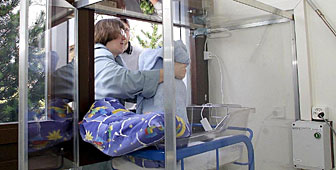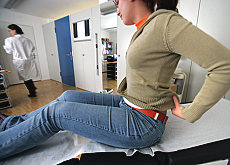Unwanted newborn delivered to baby box

An unwanted baby has been left at a hospital in Einsiedeln. The foundling is the sixth in the nearly ten-year history of the baby window, which is unique in Switzerland.
While the central Swiss abbey town was in the final throes of its annual Christmas market on Sunday, somebody placed a healthy newborn girl in the special hatch built into the hospital wall.
The delivery was made during daylight hours – at 11.45am –, the hospital announced on Monday. The baby has been appointed a legal guardian and given a name. She will remain in hospital for a few days before being placed in foster care.
The baby box is a joint project of Einsiedeln Regional Hospital and Swiss Aid for Mother and Child (SAMC), a pro-life organisation. It was opened on May 9, 2001, as a service to women who either cannot or do not want to keep their babies – and wish to give them away anonymously.
“The baby window is there to help prevent child abandonment and infanticide. If a woman places her newborn in the hatch, she is not punishable by law. However, if she abandons the baby, she could face up to five years’ imprisonment,” SAMC spokesman Dominik Müggler told swissinfo.ch.
For the first year and a half, the box remained untouched; then the first child – a newborn boy – was deposited there in September 2002. The baby dropped off on Sunday was the second in 2010.
How it works
Integrated into the outer wall of the hospital, the hatch opens to allow a baby to be placed in a small crib. Once the baby is settled, the mother closes the window – which then locks to prevent any passers-by from removing the child.
After three minutes, a silent alarm goes off inside the hospital to alert the staff to the baby’s presence. That gives the mother enough time to leave the hospital grounds if she is wary of being seen and identified.
However, the mother or father has the right to reclaim the child before it is adopted, a process which takes at least a year. A “dear mother” letter, printed in ten languages and found in the baby hatch, aims to reassure the mother while encouraging her to get in touch with either the hospital or the foundation.
“We regret, however, that the women don’t come to us before the birth so we can give them the needed assistance. That would be the better way, but we must respect their decisions,” Müggler said.
Asked by swissinfo.ch whether any of the previous five children had been reunited with their biological parents, neither the hospital nor the local authorities were able to share any information.
Legal issues
When it was set up, the baby box was rather controversial. Opponents argued that it conflicted with the United Nations Convention on the Rights of the Child, which defends a child’s right to know his or her own identity.
Others have expressed concern over the health of the mothers, who have apparently given birth without any medical attention.
In the autumn of 2009, the House of Representatives voted against two motions related to anonymous and so-called “discreet” birthing in Switzerland. The first would have legalised totally anonymous childbearing.
The second would have provided women with the chance to leave identity and health information in a sealed envelope – to be held by the authorities and released only at the request of the child in question.
“The adoption of these initiatives would give the plight of the mother priority over the child’s right to know his origin,” said parliamentarian Christa Markwalder Bär, speaking for the committee during the session handling the motions.
She added: “The purpose of the initiatives – improving the protection of life – cannot be met this way, in the view of the commission majority.”
Originally, the SAMC had wanted to open baby windows in four additional locations. It then suspended its plans to see how the parliamentary discussions would turn out.
“So the path is open for another baby window, but we can’t give any specific details at this time,” Müggler said.
Other nations
French law supports the right of a woman to have a baby in hospital and give it up for adoption anonymously. In Germany, it is not legal, yet many clinics allow women to give birth without revealing their names.
Germany has about 80 baby windows, with five in Berlin alone. Elsewhere in Europe, Italy has about ten baby windows, Hungary 12 and Poland 16. By contrast, Pakistan has 300. In the United States, there are “safe-haven” laws which allow parents to give away newborns anonymously.
Each year, the SAMC receives about 1,400-1,500 requests for help, either by telephone or email.
“Among them are many women looking to talk to somebody about an unplanned pregnancy. Financial and legal issues play a secondary role,” Müggler said.
In addition to offering counselling, the SAMC encourages a more child-friendly mentality in society.
Asked how the SAMC felt when a child was dropped off in Einsiedeln, Müggler said: “We’re pleased every time a baby is placed in the window because the baby box is clearly a very valuable form of help for women who find themselves in an extremely desperate situation.”
May 9, 2001 – Einsiedeln Hospital and SAMC open the baby box on Mother’s Day.
September 5, 2002 –
The first child, a newborn boy, is dropped off.
April 11, 2005 –
Newborn boy
August 21, 2005 –
Newborn girl
August 1, 2008 –
Newborn girl
January 22, 2010 –
Newborn girl
December 5, 2010 –
Newborn girl

In compliance with the JTI standards
More: SWI swissinfo.ch certified by the Journalism Trust Initiative












You can find an overview of ongoing debates with our journalists here . Please join us!
If you want to start a conversation about a topic raised in this article or want to report factual errors, email us at english@swissinfo.ch.